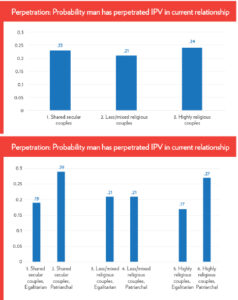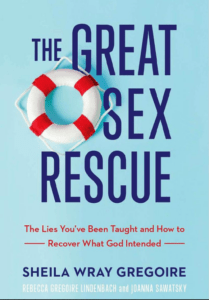Are conservative Christians doing better than people think when it comes to sex and marriage?
That’s what Josh Howerton, senior pastor of Lakepointe Church, a Dallas megachurch, claimed in a viral twitter thread. He said conservative Christians who believe in male headship actually fare better on a number of important measures — like women’s sexual satisfaction–than the general population.
His “fact check” thread was such good news that megachurch pastor and Acts 29 leader Matt Chandler retweeted it, podcasts bragged about it, and pastors used it in their sermons. Howerton later fleshed it out into an article for The Gospel Coalition.
There’s only one question: Is it actually true?
Two co-authors and I recently surveyed 20,000 predominantly evangelical women for our book The Great Sex Rescue, followed by a survey of 3,000 men for The Good Guy’s Guide to Great Sex. While church attendance definitely improved women’s marriage and sex lives, we also found those benefits were wiped out if women believe certain teachings that, tragically, are all too prevalent in our evangelical culture. For instance, ideas like “all men struggle with lust; it’s every man’s battle” or “women are obligated to have sex when their husbands want it” can actually cause women’s marital and sexual satisfaction, libido and orgasm rates to tank and rates of sexual pain to skyrocket.
“While church attendance definitely improved women’s marriage and sex lives, we also found those benefits were wiped out if women believe certain teachings that, tragically, are all too prevalent in our evangelical culture.”
So we were curious about how Howerton came to his conclusions and decided to check his sources. I’d like to zero in on two of the five measures he reported on, since they relate directly to our research: marital and sexual satisfaction.
Here’s what Howerton claims:
- Despite the cultural narrative that “Christians are sexually repressive and anti-sex, creating a toxic purity culture,” in actuality, “churchgoing, conservative Christians are in the category with the most fulfilling sex lives in America.”
- Despite the cultural narrative that “Christianity is gender-oppressive, a tool of the abusive patriarchy, and creates toxic relationships for women,” in actuality, “church attendance yields the most enjoyable and least abusive relationships for women.” Addressing the reality of #churchtoo and #metoo, he says: “Our failures in this area are failures to live up to our theology, not failures inherent in our theology.”
To provide evidence for these claims, Howerton uses charts and stats from The Institute for Family Studies World Family Map 2019. This report divides 16,000 respondents based on religiosity and beliefs about gender (traditional vs. egalitarian). “Highly religious” couples are defined as those where both spouses attend religious services at least twice a month. “Traditional” couples are defined as those who believe it’s best for everyone if the woman stays at home while the husband works. The report also associates this group with adhering to patriarchy and male headship. The group Howerton apparently identifies himself with is the highly religious, patriarchal respondents who think it’s best if women don’t work outside the home. And he says this group fared the best.
When we looked at that report, though, we found several problems.
First, Howerton conflates “conservative Christian” with “highly religious.” Imagine a classroom of 30 kids where 25 have parents with PhDs who hire tutors and five have neglectful parents. On average, the class does awesome. But we can’t tell those five neglected kids, “You’re doing awesome because your class is doing awesome!”
If you’re a small part of a big group that’s doing well, you don’t necessarily know if you’re bringing the average up or bringing the average down.
“If you’re a small part of a big group that’s doing well, you don’t necessarily know if you’re bringing the average up or bringing the average down.”
The Institute for Family Studies found that highly religious couples fared better on many measures. Most of those religious couples, though, aren’t attending your typical American Baptist church on a Sunday morning. The study consisted of Christians from a variety of countries, with Catholics outnumbering Protestants 2:1. It also included a smaller number of Buddhists, Hindus and Jews.
While it’s technically true, then, as Howerton says, that “conservative Christians are in the category with the most fulfilling sex lives,” we can’t assume more here than the data show. American conservative evangelical Protestants who believe in gender hierarchy are a subgroup (American) of a subgroup (complementarian) of a subgroup (evangelicals) of a subgroup (Protestants) of the highly religious (all world faiths), and we can’t make conclusions without looking more closely at how that subgroup fares against the other subgroups. After all, more Mexican Catholics are in the highly religious category in this report than American SBC members.
Could American evangelicals who believe in gender hierarchy and think women shouldn’t work outside the home have less abuse and better sex? Sure. But we don’t know that from this report.
Second, Howerton ignores and distorts the study’s conclusions on abuse. Howerton claims his theology makes abuse less likely to happen, and to support that, he shows a chart of marital satisfaction. Now, marital satisfaction is important. But wouldn’t a chart of the incidence of abuse be more relevant? And handily, the IFS report actually has several such charts, including these:

(source: Institute for Family Studies World Family Map 2019, p. 36)
Both charts show the opposite of what Howerton claims, and the second chart is especially alarming. Despite his claims that his theology specifically made abuse less likely, this report actually suggests a trend where religious men who believe in male headship score second to worst when it comes to committing intimate partner violence, while religious men who believe in gender equality score the best (27% of men versus 17% of men). Theology matters, yes; but in the opposite way to what Howerton claims.
Now, a big caveat: IFS says their findings about abuse and religiosity aren’t statistically significant, although the trends do point to a problem with beliefs in gender hierarchy. But the marital satisfaction chart Howerton substituted instead? The small differences between highly religious people who are egalitarian vs. patriarchal aren’t statistically significant either. This isn’t an issue of Howerton being true to the data and only showing significant results, but rather him substituting a tangentially related graph that proves what he wants to believe for the directly related graph that suggests a conclusion he can’t stomach.
Even more uncomfortably, though, the report itself warns against making the claims Howerton did:
“When it comes to domestic violence, religious couples in heterosexual relationships do not have an advantage over secular couples or less/mixed religious couples. … Our results suggest, then, that religion is not protective against domestic violence for this sample.”
Perhaps Howerton knew he was on shaky ground with his abuse claims, since he also references a different study from 2001 showing church attendance leads to lower rates of abuse. That study says nothing about conservative theology preventing abuse either, while more recent studies have suggested the problems domestic violence victims experience are compounded if those victims are religiously conservative and believe in gender hierarchy. They’re also less likely to recognize or report they’re being abused.
Instead of patting ourselves on the back when research doesn’t warrant it, maybe it’s time to heed the warnings research has given us.
Third, Howerton fails to consider women’s rates of sexual pain and pleasure. Howerton proudly declares that highly religious women enjoy better sex. That conclusion is based on just one question asking about subjective sexual satisfaction (“I am satisfied with my sexual satisfaction with my partner.”)
There’s nothing wrong with subjective measures; we used many of them in our surveys too. Combining the subjective with more objective measures, though, gives a more complete picture.
In The Great Sex Rescue, we share our findings that evangelical women suffer from vaginismus, or primary sexual pain, at more than twice the rate of the general population. We found 22.6% of evangelical women had experienced sexual pain disorders, with 7% affected so badly that penetration was difficult if not impossible. And a belief in gender hierarchy makes vaginismus more likely to occur. Our study echoes 50 years of medical research: Sexual pain is largely a conservative religious problem.
“In The Great Sex Rescue, we share our findings that evangelical women suffer from vaginismus, or primary sexual pain, at more than twice the rate of the general population.”
That’s pain; what about pleasure? We found evangelicals have a 47-point orgasm gap, meaning 95% of evangelical men report almost always or always reaching orgasm during a sexual encounter, but only 48% of women do. That doesn’t sound like something to brag about.
Now let’s look at how subjective and objective measures interact. We found that in marriages where women don’t reliably orgasm (objective measure), 72% of evangelical men say they do enough foreplay (subjective measure), but so do 53% of evangelical women. Many evangelical women do not consider their own pleasure a priority.
This leads us to ask: What if conservative evangelical women are simply more likely to rate objectively bad sex as satisfactory? That’s actually a caveat the IFS gives:
“It is possible that simply being married is more important to highly religious women, which may raise their satisfaction ratings. They may be more likely to look at their relationship through a rose-colored lens.”
 Well, we found evidence of these rose-colored glasses. Let’s look only at women who rarely or never orgasm. If they believe in a gender hierarchy, they are 22% more likely to be satisfied with the frequency they orgasm (even though it’s abysmal!) than women who believe in gender equality. The only way women in patriarchal marriages do better is if we consider apathy toward personal pleasure a perk.
Well, we found evidence of these rose-colored glasses. Let’s look only at women who rarely or never orgasm. If they believe in a gender hierarchy, they are 22% more likely to be satisfied with the frequency they orgasm (even though it’s abysmal!) than women who believe in gender equality. The only way women in patriarchal marriages do better is if we consider apathy toward personal pleasure a perk.
What happens when sexual pain is a part of the picture? Women who report having experienced vaginismus are 36% more likely to have sex at least once a week if they believe in gender hierarchy than if they believe in egalitarianism. Egalitarian women are less likely to feel they should endure pain for the sake of their husbands’ pleasure than women who believe in patriarchy.
Why might evangelical women minimize their own experience? Because that’s what they’ve been taught to do.
When an evangelical best-selling author like Emerson Eggerichs writes an entire chapter on sex in Love and Respect and never once mentions that sex should be pleasurable for women too, but instead tells wives that husbands need physical release or they will come under satanic attack and may cheat; when Steve Arterburn in Every Man’s Battle for 20 years called wives methadone for their husbands’ sex addictions; when Kevin Leman in Sheet Music says her period is a difficult time for her husband, and suggests she give him other sexual favors to help him not succumb to porn; when Gary Thomas and Debra Fileta in their new book Married Sex praise women who send risqué photos to their husband so that “neurologically” their brains will be drawn to their wives rather than to other women — is it any wonder that women don’t prioritize their own experience?
“We’ve made sex a male entitlement and a female obligation, turning it from a knowing into an owing.”
Evangelical culture has told women sex is about satisfying a man’s needs so he won’t stray. We’ve made sex a male entitlement and a female obligation, turning it from a knowing into an owing. Should we be surprised when women downplay our own needs?
Yes, religiosity tends to bring better sex and marriage. But that does not mean evangelicals who believe in male hierarchy do better. In fact, they consistently have been shown to do worse on many measures than other Christians who attend church frequently, especially if you look at objective measures rather than just subjective ones.
Maybe instead of standing in public and declaring, “Thank God I am better than those people over there,” we should, in all humility, sit down and listen to the pain of the people in our own pews. It’s time to take the plank out of our own eye.

Sheila Gregoire
Sheila Wray Gregoire is author of The Great Sex Rescue: The Lies You’ve Been Taught and How to Recover what God Intended. She also is host of the Bare Marriage podcast and a blogger at ToLoveHonorandVacuum.com.
Related articles:
The Great Sex Rescue throws a lifeline to evangelical women
How to talk with your kids about porn without sending them straight to hell | Analysis by Rick Pidcock
Don’t let the Atlanta shooter off the hook by claiming women drove him to addiction | Opinion by Kaleb Graves








































































